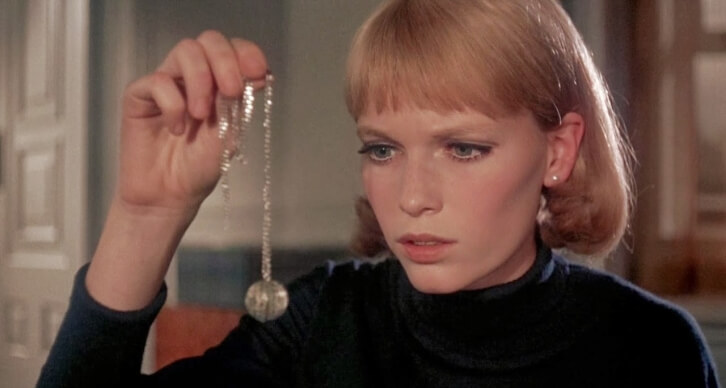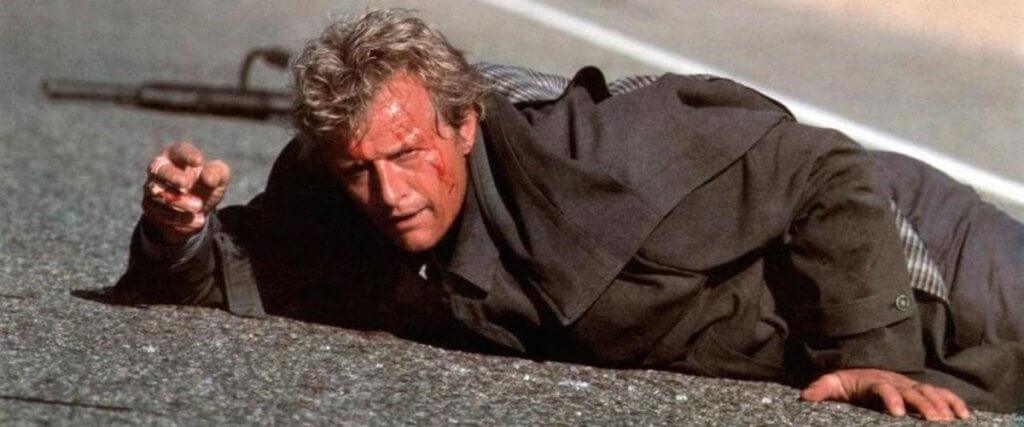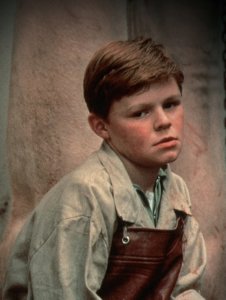Here’s another archival ArtsBeatLA post from contributor Kurt Gardner.
Originally posted in Weird Movie Village, January 2010.
Let’s take a look at some actors who created great characters in notable genre films.
1. Mia Farrow in Rosemary’s Baby. As much fun as Ruth Gordon is to watch in Polanski’s classic, it’s Farrow who really pulls it all together as the title character. When we first meet Rosemary, she has an optimistic outlook on life and an idealized view of her marriage to self-absorbed aspiring actor Guy (John Cassavetes), but she’s also a “modern” woman in the context of the times, with her own friends and opinions.

Unfortunately, when she becomes pregnant, she is all too willing to give in to Guy, Minnie (Gordon) and Roman (Sidney Blackmer), the elderly neighbors with whom her husband has become close. She switches from her young obstetrician to their recommended doctor (Ralph Bellamy) and obligingly drinks a strange herbal concoction that Minnie makes for her every day. But when the pain starts and the illness causes her to behave bizarrely, she makes a valiant effort to retain her sense of self. She hosts a party for her old friends, who are shocked at her emaciated appearance, and they give her the determination to struggle back to reality.
Weak and terrified, she is convinced that a sinister conspiracy is afoot. And when her longtime friend, Hutch (Maurice Evans) dies suddenly but bequeaths to her a book about devil worship that mentions Roman, it only serves to confirm her suspicions. She tries to tell Guy that their neighbors and their strange group of friends are devil worshipers who want to sacrifice their child to Satan, but he shrugs it off. As the audience, we too are implicated: we know Rosemary is half-right in her beliefs, but we can’t do anything about it, making the suspense even more agonizing as the circle closes in.
Farrow does a wonderful job of taking us through the various stages of her character’s development. She does a 360 — starting as a confident, relatively independent-minded young woman who eventually gives in to her husband’s (and the Castavets’) wishes, only to fight back against the sickness and encroaching paranoia to come back strong in a final effort to save her baby’s life. Whether the climactic scene indicates her ultimate defeat or a determination to make the best of a horrific situation in order to care for her child (however demonic it may be) is open to interpretation. I’m convinced it’s the latter.
2. Rutger Hauer in The Hitcher. The key to making a film like this work is casting an actor with the queasy charisma needed to inhabit an amoral character like John Ryder, the psychotic drifter Jim Halsey (C. Thomas Howell) is unlucky enough to pick up on a desert highway on a rainy night.
Some have commented about the film’s homoerotic angle — that Ryder had repressed sexual urges for Halsey, but I think that’s selling it short. Or that Ryder is the “dark side” of Halsey’s personality. While his encounter with the psycho has certainly given the young man a quick lesson in evil, I don’t think that’s it, either.

I personally think that Ryder has been traveling these same highways for years on his endless killing spree, and he’s just plain tired. He no longer gets that electric thrill when he kills, and he wants it to be over. His cat-and-mouse games have necessarily become more complicated, and Halsey is the latest mouse he’s drawn into his trap.
The clues are all over the place. Early on, he tells Halsey, “I want you to stop me.” He even rescues him on a couple of occasions when he could easily have snuffed him, because he wants the game to continue. Plus, allowing Halsey to be accused by the police of the murders he himself has committed adds to what’s left of his excitement.
I think that’s how Hauer understood the character, too. His portrayal of Ryder is so world-weary, he practically sighs, “been there, done that.” The only times he does get enthusiastic are when he’s walking the razor’s edge — and forcing Halsey to do it at the same time, as when he’s challenging — and killing cops.
That’s what makes the performance so memorable. In lesser hands, this could’ve just been another psycho, but Hauer imbues the character’s every expression and intonation with deeper meaning…and it’s fascinating to watch.

3. Eamonn Owens in The Butcher Boy. Not since Tatum O’Neal took the Academy Awards by storm in Bogdanovich’s 1973 Paper Moon has a child actor delivered such a terrific, precocious performance. And young Owens had much darker material to work with.
He plays Francie Brady, the only child of dysfunctional parents (Aisling O’Sullivan and Stephen Rea), whose mental and physical maladies would kick any normal child to the curb, but he possesses such a strong sense of self and determination (aided by his own mental illness, I must add) that the disintegration of his family unit is little more than a bump in the road. Even the local scrubbers are wreathed in smiles when Francie comes by, fast-talking and glamorizing them like a lost member of a traveling circus.
He pulls off a number of childish pranks with his best friend Joe (Alan Boyle), but when they become more and more violent, Joe backs away, and he incurs the wrath of a harridan neighbor, Mrs. Nugent (Fiona Shaw), who starts bad-mouthing his parents. Francie’s hatred of the woman escalates and he finally kills her. As a result, he’s committed to a mental institution.
The film is narrated by a much older Francie (in a wryly hilarious voiceover provided by Rea), who is still inside the institution and happily describes the awful incidents that brought him to where he is now. At times, Owens faces the camera to address his own “elder” voice, and it’s in these sequences where he really shines.
So energetic is the film (and his performance) that you can’t help but laugh at the increasingly horrible crimes he commits, and you even feel a sort of vindication when he breaks into Mrs. Nugent’s house and shits on her carpet. And that’s only the beginning.
I have to confess this is my favorite Jordan film so far. I love The Company of Wolves and Interview with the Vampire, but this one is packed with passion and enthusiasm. It’s truly exuberant filmmaking. And it just wouldn’t have happened without Owens’ terrific portrayal of Francie.





